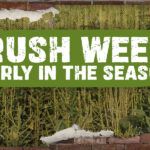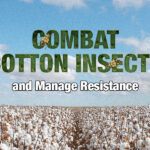Growers Unite to Cultivate Change
The Leadership At Its Best conference keeps farming in the conversation on Capitol Hill.

Agriculture contributes more than $220 billion to the U.S. gross domestic product (GDP), but farming families comprise only 2% of the American population. They contend with volatile markets, regulations and environments to keep food on the table for the 98% who, on average, are at least three generations removed from agriculture.
The future of agriculture depends on united advocacy from individuals along with grower and trade organizations. Keeping agricultural issues at the forefront of policy negotiations and conversations in homes across the country requires farmers to become savvy storytellers and strong leaders in addition to their roles as entrepreneurs, educators and environmental stewards.
The Leadership At Its Best (LAIB) conference, organized by Syngenta, empowers agricultural leaders to represent the industry in Washington, D.C. and at home. LAIB celebrated its 40th year of advocacy education in 2025. Fifty representatives from 12 grower and trade associations learned skills like networking, media training and action advocacy leading up to change-making conversations on Capitol Hill. They were nominated by organizations like the American Soybean Association, National Corn Growers Association and American Agri-Women.
Becoming Strong Storytellers
This year’s LAIB attendees arrived in D.C. with stories to tell. They have intimate knowledge of the issues facing their operations and their nominating associations recognize them as leaders. The goal of LAIB isn’t to teach attendees what to say; it’s to equip them with the skills to share their experiences and advocate for change.
“It’s important that we tell our story and teach others to tell their stories to people that don’t know much about agriculture,” says Macie O’Shaughnessy, industry relations manager at Syngenta. “We challenge everybody to be vulnerable, work on their weaknesses, and share their strengths. We enable them to tell their stories and be fierce advocates.”
The conference kicks off with a day of intensive networking to encourage attendees to share their experiences outside their usual circles.
“The program has been phenomenal,” says Bill Parks, a Mississippi grower representing the American Farm Bureau Federation. “In a rural area like where I’m from, you can feel alone. Here, you talk to and learn from others like you, and it builds confidence.”
These conversations also help growers see the bigger picture of what’s happening on farms across the country. It’s critical that attendees examine issues from different perspectives and combine their voices to combat the challenges facing agriculture.
Key issues include access to technology, operational flexibility within restrictions, and regulatory challenges. While not unique to one region, crop or sector, representatives on the Hill may still be unfamiliar with them.
“Everyone here operates differently, but we agree on many key issues,” says Kole Pederson, a representative of the National Agricultural Aviation Association. “Being able to share perspectives here is so helpful. It allows subsectors of the industry to work better together.”
The Road to Capitol Hill
With years of experience and expertise, the folks at Syngenta engage their relationships to further collaboration. “We can advocate for all the details when we have multiple groups working together,” says O’Shaughnessy. “Our connections and networks elevate us.”
After a full day of building confidence and hearing from other voices in agriculture, the LAIB cohort attends sessions led by media and storytelling experts.
The first was led by Johnna Miller, senior director of media and advocacy training for the American Farm Bureau Federation. She shared best practices for working with the media, the ins and outs of soundbites, and how to make sure the most important parts of their messages make it on camera. Next, attendees learned from Aaron Putze, author, public speaker, and chief officer of brand management and engagement for the Iowa Soybean Association, about finding memorable ways to share their personal stories with legislators.
“I learned that representatives want to hear about our experiences, which helps them continue to make changes in the country,” says Janie Cornelius, sales support lead at Cornelius Seed representing the Independent Professional Seed Association. “In D.C., they don’t know what we’re experiencing in agriculture. Our stories can have huge impacts on farmers across the nation.”
Fortunately, attendees felt well-prepared to tell those stories after the week’s programming. “The session with Mr. Putze really helped me get my message together for my Capitol Hill meetings. He helped us dig deep into our own brains to pull those ideas out,” says Elizabeth Spruell, an Alabama grower representing American Agri-Women. “Now, I’m more capable of stepping in front of the camera and answering hard questions. At the same time, I’m representing and advocating for the industry I love so dearly.”
Beyond the Capitol
What’s next for the future of agriculture advocacy? All attendees leave LAIB with newfound confidence, storytelling skills, media savvy and lobbying experience. Many also have successful conversations with legislators under their belts.
“We send everybody home with a new network and many action opportunities,” says O’Shaughnessy. “One of the most powerful pieces is building that network between associations. These ag representatives are all already leaders, and leaders are always learning.”
Leaders are always teaching, too. The impact of the conference ripples to the nominating organizations and beyond. “I’m excited,” Janie Cornelius says. “Not only am I better able to tell my story, but I’m more prepared to step into a mentorship role. The skills I’ve gained here are going to help me develop others and grow myself.”
Though the most impactful lessons learned from LAIB varies between attendees, one thing is certain. This conference is only the jumping-off point.
“Leadership At Its Best opened my eyes to a larger network and agriculture across the country,” says Spruell. “Networking with individuals on their own journey through leadership helps me frame my own pathway and I’m excited for what’s next.”
For many, LAIB is a great reminder of the importance of getting involved with organizations. The time is right, Spruell says. “Farmers are the 2% growing food for the 98%. Our voice is small, but we can unify, arm-in-arm, to get the message across for our food and fiber security.”
And it’s easier than they would’ve thought. “Your voice matters,” says Parks. “I know now it’s as simple as finding your local organization or dropping by the Hill. Take it from a small-town farmer like me — You can make a difference, and that’s the honest truth.”
4 Min Read
- The future of agriculture depends on united advocacy from those in the industry.
- Syngenta hosts the Leadership At Its Best conference in Washington, D.C. to teach up-and-coming leaders to become savvy storytellers.
- Agricultural organizations and mentors can help anyone with a passion for ag further the industry.
More Articles About Community & Culture
4 Min Read


















